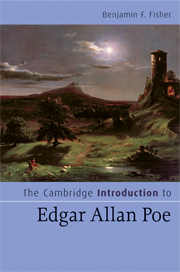Chapter 3 - Works
Published online by Cambridge University Press: 05 June 2012
Summary
Poe's canon contains some of the most widely known literary works in the world. His early desire to be a poet has been gratified many times over, if from no other source than the popularity of “The Raven,” one of the best-known poems in the English language, though many more reasons for such reputation exist. The early “To Helen (‘Helen, thy beauty is to me …),” “The Sleeper,” “The City in the Sea,” “The Coliseum,” “Sonnet – To Science,” “The Bells,” “Annabel Lee,” “Ulalume” and “Eldorado”: all are well known. Poe's critical dicta are likewise familiar and repeatedly cited, e.g. that a “long poem” is a contradiction in terms, that poetry must have a distinctive “music,” that prose inclines more toward truth than poetry (beauty is the aim of poetry), that the brief prose tale is the greatest form in fiction, that the ideal reading time spans no more than an hour and a half. Poe's tales have, however, become his most significant legacy. “Ligeia,” “The Black Cat,” “The Tell-Tale Heart,” “William Wilson,” “The Fall of the House of Usher,” “The Murders in the Rue Morgue,” “The Masque of the Red Death,” “MS. Found in a Bottle,” “The Gold-Bug,” “The Purloined Letter,” “The Cask of Amontillado” remain favorites among makers of books, whether Poe's works themselves furnish the contents or whether one or another of these tales (or poems or critiques or The Narrative of Arthur Gordon Pym or Eureka, entire or excerpted) appears in selective compilations.
- Type
- Chapter
- Information
- The Cambridge Introduction to Edgar Allan Poe , pp. 27 - 111Publisher: Cambridge University PressPrint publication year: 2008



